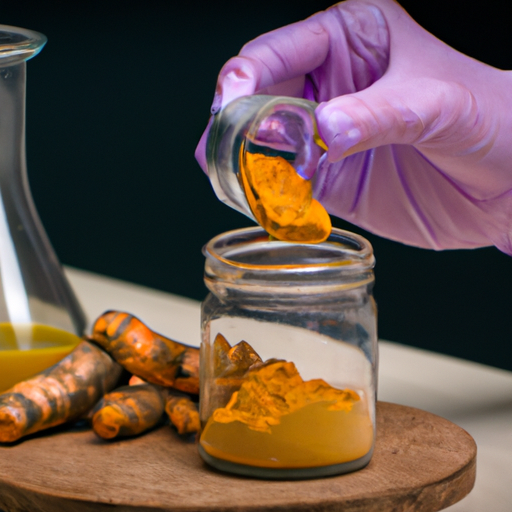If you’re searching for a comforting and healing drink that also offers various health advantages, turmeric tea is the answer. This age-old spice, recognized for its vibrant yellow hue and comforting, earthy taste, has been utilized for generations in traditional medicinal customs.
Modern research is showing that turmeric tea may be good for you in a variety of ways. First and foremost, turmeric tea is packed with antioxidants and anti-inflammatory compounds, which can help protect your body from damage caused by free radicals and inflammation.
But that’s just the beginning of the benefits that this drink can offer. From improving brain function to reducing joint pain, turmeric tea is a versatile and delicious way to support your overall health and well-being.
So let’s dive in and take a closer look at why turmeric tea is good for you!
Key Takeaways
- Turmeric tea is packed with antioxidants and anti-inflammatory compounds that protect the body from damage caused by free radicals and inflammation.
- Curcumin, a compound found in turmeric, has potent antioxidant properties and can be just as effective as anti-inflammatory medications.
- Drinking turmeric tea can improve brain function, reduce joint pain, lower cholesterol levels and blood pressure, and aid in stress reduction.
- However, overconsumption can lead to negative effects, and pregnant or breastfeeding women should consult with a doctor before consuming it. It can also interact with certain medications. Moderation is key.
What is Turmeric Tea?
You’re going to love turmeric tea – it’s a warm, comforting beverage made from the root of the turmeric plant that’s packed with anti-inflammatory properties. Turmeric tea has been used for centuries in traditional Ayurvedic medicine to treat a variety of ailments, from joint pain to digestive issues. In recent years, it’s gained popularity as a health-promoting drink due to its many benefits.
To prepare turmeric tea, simply boil water and add a teaspoon of ground turmeric or grated fresh turmeric root. You can also add other spices like ginger or cinnamon for added flavor. Let the tea steep for a few minutes before straining and enjoying. Not only is it easy to make, but it’s also a delicious and healthy way to incorporate turmeric into your diet.
Moving on to the nutritional composition of turmeric tea…
Nutritional Composition
Packed with antioxidants and anti-inflammatory properties, turmeric tea is a great addition to your diet. This beverage is not only delicious, but it also provides a boost of essential nutrients that your body needs. Here are three nutritional benefits that turmeric tea can offer you:
-
Turmeric is rich in curcumin, a compound that has potent antioxidant properties. This means that it can help protect your cells from damage caused by free radicals. In addition, curcumin has been shown to reduce inflammation in the body, which can help prevent chronic diseases.
-
Turmeric tea is a great source of iron, a mineral that is essential for the production of red blood cells. Iron is also important for maintaining healthy skin, hair, and nails.
-
Drinking turmeric tea can also help boost your immune system. This is because turmeric contains compounds that have antiviral, antibacterial, and antifungal properties. By consuming turmeric tea regularly, you can help strengthen your immune system and reduce your risk of getting sick.
Overall, turmeric tea is a great beverage to add to your daily routine. It is packed with essential nutrients that can offer a range of health advantages.
In the subsequent section, we’ll delve deeper into the specific health benefits of drinking turmeric tea.
Health Benefits
You’ll be pleased to know that turmeric tea has a host of health benefits. Firstly, it has anti-inflammatory effects that can help reduce inflammation in the body, which is linked to many chronic diseases.
Secondly, turmeric tea has antioxidant properties that can help protect your body from damage caused by free radicals.
And lastly, it has antibacterial properties that can help fight off harmful bacteria in your body.
Overall, incorporating turmeric tea into your diet can have many positive effects on your health.
Anti-inflammatory Effects
Turmeric tea is known for its ability to reduce inflammation in the body, making it a great option for those with conditions such as arthritis or joint pain. In fact, turmeric has been used for thousands of years in Ayurvedic medicine as an anti-inflammatory agent.
Incorporating turmeric tea into an anti-inflammatory diet can help reduce inflammation throughout the body, including in the joints and muscles. Studies have also shown that turmeric supplements, including turmeric tea, can be just as effective as over-the-counter anti-inflammatory medications in reducing inflammation. This is due to the active ingredient in turmeric, curcumin, which has been shown to have strong anti-inflammatory effects.
By regularly consuming turmeric tea, you can help reduce inflammation in your body and potentially alleviate symptoms of conditions such as arthritis or joint pain. Next, let’s explore how turmeric tea’s antioxidant properties can benefit your health.
Antioxidant Properties
With its powerful ability to neutralize free radicals, incorporating turmeric tea into your diet can help protect your body from oxidative stress and potentially reduce the risk of chronic diseases. Turmeric contains a compound called curcumin, which is a potent antioxidant.
Antioxidants are important because they help to prevent damage to our cells caused by free radicals, which are unstable molecules that can cause oxidative stress. Oxidative stress is linked to the aging process and can contribute to the development of chronic diseases such as cancer, diabetes, and heart disease.
By consuming turmeric tea, you can help to protect your body from oxidative stress and potentially reduce your risk of developing these diseases. Additionally, curcumin has been shown to have a positive effect on skin health, helping to reduce inflammation and improve the overall appearance of the skin.
As you move into the subsequent section about the ‘antibacterial properties’, it’s important to note that turmeric’s ability to fight off harmful bacteria is another reason why it’s such a beneficial addition to your diet.
Antibacterial Properties
Now that you know about the antioxidant properties of turmeric tea, let’s talk about its antibacterial properties. Turmeric is known for its use in natural remedies, and one of its benefits is its antibacterial properties.
It can help fight against various bacterial infections and prevent the growth of harmful bacteria. This is especially important in a time when antibiotic resistance is becoming a growing concern. Studies have shown that curcumin, the active ingredient in turmeric, can inhibit the growth of certain bacteria, including E. coli, Staphylococcus aureus, and Salmonella.
This makes turmeric tea a great addition to your diet to boost your immune system and prevent bacterial infections. Incorporating natural remedies like turmeric tea into your daily routine can help you maintain good health and avoid the overuse of antibiotics that contribute to antibiotic resistance.
As you can see, turmeric tea has many health benefits beyond its delicious taste. Next, we will discuss how it can also improve brain function.
Brain Function
You may notice an improvement in your memory and concentration after regularly drinking turmeric tea. This is shown in a study where participants who consumed curcumin, the active compound in turmeric, had better cognitive function than those who didn’t. Curcumin has anti-inflammatory and antioxidant properties that protect the brain from damage and improve blood flow, which enhances cognitive function and mental clarity.
Here are four ways that turmeric tea can benefit your brain:
-
Reduces inflammation: Curcumin reduces inflammation in the brain, which can cause cognitive impairment and increase the risk of neurodegenerative diseases like Alzheimer’s and Parkinson’s.
-
Increases brain-derived neurotrophic factor (BDNF): Curcumin increases the production of BDNF, a type of protein that promotes the growth and survival of neurons in the brain, which enhances learning, memory, and mood.
-
Boosts antioxidant activity: Curcumin has powerful antioxidant properties that protect the brain from oxidative stress, which can damage cells and contribute to cognitive decline.
-
Improves blood flow: Curcumin improves blood flow to the brain, which delivers oxygen and nutrients to brain cells and enhances cognitive function.
Drinking turmeric tea regularly can have a positive effect on your brain function and overall health. Next, we will explore how turmeric tea can also alleviate joint pain.
Joint Pain
Relieving joint pain can be accomplished through consuming turmeric tea. Turmeric is known for its anti-inflammatory properties, which can help reduce joint pain and stiffness. Studies have shown that curcumin, the active ingredient in turmeric, can block inflammatory cytokines and enzymes that contribute to joint inflammation.
Natural remedies like turmeric tea are becoming increasingly popular as alternative therapies for joint pain. Unlike prescription medications, natural remedies are generally considered safe and have fewer side effects. Additionally, turmeric tea is easy to make and can be enjoyed on a daily basis as a preventative measure for joint pain.
Transitioning into the subsequent section about heart health, it’s important to note that turmeric tea not only benefits joint health but also has potential benefits for heart health. Let’s take a closer look at how turmeric tea can promote a healthy heart.
Heart Health
If you’re looking to improve your heart health, turmeric tea may be a good addition to your routine. The spice has been shown to lower cholesterol levels, which can reduce your risk of heart disease.
Additionally, turmeric has been linked to lower blood pressure, which is another important factor in maintaining cardiovascular health.
Cholesterol Levels
Turmeric tea can help reduce high cholesterol levels due to its powerful plant compounds. Cholesterol is a waxy substance that can build up in the arteries and cause blockages, leading to heart disease. Causes of high cholesterol include a poor diet, lack of exercise, smoking, and genetics. If you’re struggling with high cholesterol levels, turmeric tea can be a natural remedy for cholesterol management.
Here are three ways in which turmeric tea may help lower your cholesterol levels:
- Turmeric contains curcumin, which has been shown to lower LDL (bad) cholesterol levels.
- Turmeric tea can help reduce inflammation in the body, which is linked to high cholesterol levels.
- Turmeric tea may help improve liver function, which can also contribute to lower cholesterol levels.
Lowering your cholesterol levels is important for maintaining heart health. However, managing your blood pressure is also crucial. Let’s explore how turmeric tea can benefit blood pressure in the next section.
Blood Pressure
To maintain a healthy blood pressure, it’s important to understand the factors that can contribute to high or low readings. Hypertension or high blood pressure is a common condition that can lead to serious health issues such as heart disease, stroke, and kidney problems. Causes of hypertension can include genetics, age, lifestyle factors, and stress.
One way to help manage blood pressure is through stress reduction techniques such as meditation, exercise, and consuming certain foods and beverages. Turmeric tea has been shown to have anti-inflammatory properties and may help reduce stress levels. Additionally, a study published in the Journal of Clinical Hypertension found that curcumin, the active ingredient in turmeric, may have beneficial effects on blood pressure and vascular function. Check out the table below for a breakdown of the potential benefits of turmeric tea for blood pressure management.
| Potential Benefits of Turmeric Tea | |||
|---|---|---|---|
| Anti-inflammatory properties | May reduce stress levels | May improve vascular function | May have beneficial effects on blood pressure |
Moving on to cancer prevention, incorporating certain foods and beverages into your diet can also help reduce your risk of developing the disease.
Cancer Prevention
If you’re interested in preventing cancer, turmeric tea may be worth adding to your routine. Studies have shown that the curcumin in turmeric has anti-inflammatory and antioxidant properties, which may help protect against certain types of cancer.
Specifically, research has shown that turmeric may be beneficial in preventing colon cancer and breast cancer.
Colon Cancer
Although there’s no guarantee that consuming turmeric tea will prevent colon cancer, studies have shown it may help reduce the risk. Here are four ways turmeric tea may aid in preventing colon cancer:
-
Turmeric contains curcumin, an active ingredient with anti-inflammatory properties. Chronic inflammation in the colon can lead to cancer, so reducing inflammation may help prevent cancer from forming.
-
Turmeric has antioxidant properties, which can protect against cell damage. Cell damage can also lead to cancer.
-
Turmeric inhibits the growth of cancer cells in the colon. Although more research is needed, this suggests turmeric may prevent cancer cells from dividing and spreading.
-
Turmeric improves gut health by promoting the growth of beneficial bacteria and reducing inflammation in the gut. Maintaining a healthy gut may help prevent colon cancer.
Moving on to breast cancer, it’s important to note turmeric tea may also have a potential role in prevention and treatment options for this type of cancer.
Breast Cancer
Breast cancer is a prevalent and concerning disease that affects many women worldwide. It’s the most common cancer among women in both developed and developing countries. While hormone therapy is often used to reduce the risk of breast cancer, there are natural remedies that can also be effective in breast cancer prevention.
One such remedy is turmeric tea, which has been shown to have anti-cancer properties. Turmeric contains a compound called curcumin, which has been found to inhibit the growth of breast cancer cells and reduce the risk of breast cancer. Curcumin is also known to have anti-inflammatory properties, which can help reduce the risk of breast cancer as chronic inflammation has been linked to the development of cancer.
Incorporating turmeric tea into your diet can be an effective way to reduce your risk of breast cancer while also providing a range of other health benefits. Transitioning into the subsequent section about ‘digestive health’, it’s important to note that turmeric tea can also improve digestion and reduce inflammation in the digestive tract. This can be beneficial for those who suffer from digestive issues such as bloating, gas, and indigestion.
By incorporating turmeric tea into your daily routine, you can not only reduce your risk of breast cancer but also improve your overall digestive health.
Digestive Health
Turmeric tea can help soothe digestive issues like bloating and gas, making you feel more comfortable and at ease after a meal. This is because turmeric has anti-inflammatory properties that can reduce inflammation in the gut.
Additionally, turmeric can support a healthy gut microbiome by promoting the growth of beneficial bacteria. This can improve digestion and overall gut health.
To further support digestive health, turmeric tea can also aid in the production of digestive enzymes. These enzymes are responsible for breaking down food into nutrients that the body can absorb. Turmeric can stimulate the production of these enzymes, helping the body to more efficiently digest food.
Overall, incorporating turmeric tea into your diet can be a simple and effective way to support digestive health and improve overall gut function.
Speaking of incorporating turmeric tea into your diet, it’s important to be aware of any potential side effects.
Side Effects
When consuming turmeric tea, it’s important to be aware of potential side effects. One of the most notable is the potential for interactions with certain medications, such as blood thinners.
It’s also possible to overconsume turmeric, which can lead to digestive issues and other health concerns. Despite these risks, the benefits of turmeric tea are numerous, including its anti-inflammatory and antioxidant properties.
To ensure safe and effective consumption, it’s recommended to consult with a healthcare professional and stick to moderate intake.
Interactions with Medications
If you’re taking any medications, be aware that drinking turmeric tea might interact with them, so it’s important to talk to your doctor before adding it to your daily routine. Turmeric can increase the risk of bleeding, so it’s advised to avoid it if you’re taking blood thinners or antiplatelet drugs.
Additionally, turmeric tea can interact with drugs that affect the liver, such as statins, and can cause an increase in the levels of these drugs in the bloodstream. It’s important to take cautionary measures to prevent any adverse effects from the interaction of turmeric tea with medications.
If you have been advised by your doctor to avoid certain foods or drinks while taking medications, it’s important to follow their guidance. Not all medications will interact with turmeric tea, but it’s better to be safe than sorry.
Now, let’s move on to the next section about the potential risks of overconsumption.
Overconsumption
It’s easy to go overboard with any trendy health drink, and turmeric tea is no exception. While it’s true that turmeric has many health benefits, overconsumption can lead to negative effects. So, how much turmeric tea should you drink?
The answer is that it depends on your personal circumstances, but there are some general guidelines you can follow to avoid overconsumption. Here are four things to keep in mind when it comes to turmeric dosage and overconsumption:
-
The recommended daily intake of turmeric is one to three grams per day.
-
If you’re pregnant or breastfeeding, it’s important to talk to your doctor about how much turmeric you can safely consume.
-
If you’re taking medication, especially blood thinners or diabetes medication, be sure to talk to your doctor before drinking turmeric tea as it can interact with these medications.
-
Too much turmeric can cause stomach upset, diarrhea, and even liver damage in rare cases.
Remember, moderation is key when it comes to enjoying the benefits of turmeric tea. By following the recommended dosage and talking to your doctor if you have any concerns, you can safely enjoy the benefits of this delicious and healthy drink.
And speaking of benefits, let’s take a closer look at some of the reasons why turmeric tea is good for you.
Summary of Benefits
Get ready to reap the rewards of this golden elixir – studies have shown that regular consumption of turmeric tea can lower your risk of heart disease by up to 65%. But that’s not all, the benefits summary of this spice-infused drink goes beyond cardiovascular health. Turmeric tea also has anti-inflammatory properties that can alleviate joint pain and reduce inflammation in the body.
To give you a clearer picture, here’s a table summarizing the potential benefits of regular turmeric tea consumption:
| Benefit | Explanation |
|---|---|
| Reduces Inflammation | Curcumin, the active ingredient in turmeric, has anti-inflammatory properties that can help reduce joint pain and inflammation in the body. |
| Lowers Cholesterol | Studies have shown that the curcumin in turmeric can decrease levels of LDL or "bad"cholesterol in the body. |
| Boosts Immune System | Turmeric has antimicrobial properties that can help boost your body’s immune system and protect against infections. |
| Improves Digestive Health | Turmeric tea can help alleviate symptoms of digestive issues such as bloating and gas. |
| May Prevent Cancer | Some studies suggest that the curcumin in turmeric may have anti-cancer properties and could potentially prevent the growth of cancer cells. |
While there are many potential benefits of consuming turmeric tea, it’s important to note that there may also be some drawbacks. For instance, consuming too much turmeric can cause gastrointestinal distress or interact with certain medications. Therefore, it’s important to consume turmeric tea in moderation and consult with a healthcare provider if you have any concerns.
Now, let’s move on to the next section where we’ll discuss recommendations for consuming turmeric tea.
Recommendations for Consumption
Now that you’ve learned about the various benefits of turmeric tea, it’s time to explore the best ways to consume it.
To fully enjoy the benefits of turmeric tea, it’s important to prepare it correctly. There are many turmeric tea recipes available online, but the simplest way is to boil water, add a teaspoon of turmeric powder or grated turmeric, and let it steep for 10-15 minutes. You can also add honey or lemon for taste.
It’s recommended to drink turmeric tea at least once a day, preferably in the morning. This is because turmeric contains curcumin, which has anti-inflammatory properties that can help reduce inflammation throughout the body. Drinking turmeric tea in the morning can also help jumpstart your metabolism and improve digestion.
However, it’s important to note that turmeric can interfere with certain medications, so it’s best to consult with your healthcare provider before consuming it regularly.
Frequently Asked Questions
How does turmeric tea compare to other forms of consuming turmeric, such as supplements or raw turmeric?
When compared to supplements, turmeric tea may not be as effective due to lower concentration levels. However, cooking with turmeric can provide health benefits. It’s important to consult with a healthcare professional before incorporating turmeric into your diet.
Can turmeric tea be consumed during pregnancy or while breastfeeding?
Ease your morning sickness with a cup of turmeric tea, it’s safe to consume during pregnancy and breastfeeding. This tea can also aid in postpartum recovery by reducing inflammation and boosting immunity. Evidence-based benefits make this a healthy choice.
Does the addition of other ingredients, such as honey or milk, affect the health benefits of turmeric tea?
Adding honey or milk to turmeric tea can enhance its taste without compromising its health benefits. Studies show that honey has antioxidant properties, while milk can improve the bioavailability of curcumin, the active compound in turmeric. Explore your taste preferences and enjoy the benefits of turmeric tea.
Is it safe to consume large quantities of turmeric tea on a daily basis?
Slow down! While turmeric tea benefits are numerous, excessive consumption may pose potential risks. Factors such as individual health conditions impact safe consumption. Consult a healthcare provider and enjoy in moderation.
Are there any potential interactions between turmeric tea and prescription medications?
Be cautious of potential drug interactions when consuming turmeric tea with prescription medications. Talk to your healthcare provider about any safety precautions you should take. Evidence supports its anti-inflammatory and antioxidant properties.
Conclusion
Congratulations, you now know why turmeric tea is good for you! This tea can provide numerous health benefits such as improving brain function, reducing joint pain, promoting heart health, preventing cancer, and aiding in digestion.
Imagine sitting down with a warm cup of turmeric tea, feeling the soothing effects of its anti-inflammatory properties as it works its way through your body. This tea can be the perfect addition to your daily routine, providing not only a delicious flavor but also a host of health benefits.
So why not give it a try and see the positive impact it can have on your well-being? With turmeric tea, you can nourish your body and feel good from the inside out.










